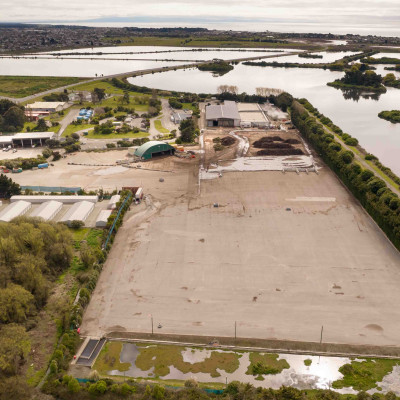Organics processing will move out of Bromley
Share this story
The future processing of Christchurch’s kerbside organics is set to change with the Council approving the establishment of a new organics processing plant, Ōtautahi Christchurch Regional Organics Processing Facility.
Today, Wednesday 6 December, the Council approved Ecogas as the new long term organics processor, following a multi-stage procurement process.
The facility will deliver a fundamental change from the existing Organics Processing Plant at Metro Place in Bromley through fully enclosed operations and technology successfully used in cities around the world, including London, Sydney and Madrid.
Councillors also approved a short-term option for managing kerbside organics until the long term solution is operational.
It involves two stages of organics processing:
- The first stage would see kerbside organics being processed indoors at the Organics Processing Plant in Bromley. This involves mixing organics with garden waste, shredding the material, then moving the material into the composting tunnels.
- Partially composted material would then be loaded into trucks directly from the tunnels inside the processing hall and transported to Kate Valley Landfill. Once there, the second phase of processing would occur with material matured in outdoor rows, screened and then sold to the market.
This process could be implemented by April 2024.
The new plant is a comprehensive solution for the Council’s organics processing requirement, as it diverts a wide range of organic waste from landfill and composting. This provides positive environmental outcomes and decarbonisation opportunities across the region.
Anaerobic digestion technology and a biofuel processing line will convert mixed kerbside organics and garden waste into renewable and regenerative products such as fertiliser, biogas and biofuel. Because it’s fully enclosed, there are no odours associated with the operations.
The biogas produced through the anaerobic digestion process will be used as a renewable energy alternative to current fossil fuels and supplied to neighbouring industrial businesses. The liquid portion becomes a biofertiliser, used to regenerate soil and provide nutrition for crops. The wood portion becomes a biofuel, and is also used as alternative to fossil fuels.
The new plant also contributes positively to emissions reductions as it’s expected to reduce emissions by 80% compared to the current Organics Process Plant’s operation. This is a substantive reduction of greenhouse gas emissions that aligns with the Council’s climate change goals.
Mayor Phil Mauger says the outcome is a win for both Christchurch and wider Canterbury.
“As a Council we’ve been committed to finding a long term organics processing solution that reduces emissions, avoids odour and allows residents to continue using our three-bin kerbside service. The new plant will be designed with sufficient processing capacity for kerbside organics from other councils, as well as commercial producers, so will enable the diversion of organics from landfill to reduce emissions for the whole region.”

Ōtautahi Christchurch Regional Organics Processing Facility will be located on an industrial site in Aruhe Road, South Hornby.
“The location of the long term solution has been carefully considered. The new plant will be located in an industrial area, which is zoned for this type of activity,” Mayor Mauger says.
“The plant will deliver a totally different system from how we do things at the existing Organics Processing Plant at Metro Place in Bromley. We’re confident the new solution provides an industry-standard, sustainable practice for organics processing, servicing both our growing city and region.
“The key thing is working with the community to help them understand how this new system works and the benefits it offers.”
The cost to the Council of processing organics at the new plant can be met through existing planned budgets included in the Council’s Long Term Plan 2024–34. This means the new solution will not impact rates.
A partnership between Pioneer Energy and EcoStock, Ecogas currently operates an anaerobic digestion plant in the North Island. The new plant in South Hornby is expected to be operational by late 2026.
